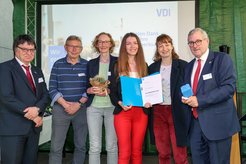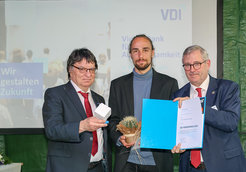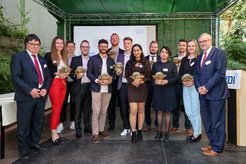Karina Oliynyk and Johannes Kopton receive VDI Funding Awards for their Master's Theses
Award-winning research on the cost-effective production of artemisinin for malaria treatment and on microalgae as a rapidly renewable feedstock
The outstanding work of young scientists at the MPI Magdeburg has been honored with funding awards from the Association of German Engineers (VDI) - Magdeburg Regional Association.
Crystallization as a purification step for the production of Artemisinin from Artemisia annua extracts
Karina Oliynyk was awarded one of the VDI Funding Prizes for her master's thesis entitled "Investigation and optimization of the crystallization-based purification of Artemisinin from the complex plant extract", which she wrote at Otto von Guericke University Magdeburg.
Malaria is the most common infectious disease in the world. Combination preparations based on derivatives of Artemisinin (Artemisinin-based combination therapy) are successfully used to treat it. Artemisinin is mainly extracted from the annual mugwort (Artemisia annua).

The topic of Ms. Oliynyk's master's thesis is part of the research work on the extraction and semisynthetic production of Artemisinin from the Artemisia annua plant, which has been carried out intensively at the MPI Magdeburg for several years. With her Master's thesis, Ms Oliynyk has made a substantial contribution to the investigation and optimization of crystallization as the final purification step in the extraction of artemisinin from Artemisia annua extracts.
Karina Oliynyk studied Chemical Engineering: Molecular and Structural Product Design at the Faculty of Process and Systems Engineering at Otto von Guericke University, first obtaining her Bachelor's and then her Master's degree. She is currently pursuing her a PhD thesis at the MPI Magdeburg.
Trailblazing results for the process design of microalgae biorefineries
Johannes Kopton was awarded one of the VDI Funding Prizes for his master's thesis as part of the research project "ProPhoS - Biochemical production systems using photosynthetic organisms".
In the ProPhoS project, microalgae serve as a regenerative, rapidly renewable feedsock and are to be used in a "zero-waste" biorefinery process for the sustainable production of fatty acids, pigments and other products. Various separation sequences are possible for this, which differ in terms of yield, profit and the amount of greenhouse gases emitted.

In his master's thesis, Johannes Kopton presents pioneering modelling and optimization approaches for process design. The aim is to identify an optimal separation sequence for a microalgae biorefinery based on the species Phaeodactylum tricornutum. From a large number of possible combinations of separation steps, his model enables the prediction of the economically and ecologically optimal sequence. The modeling is based on experimental data, quantum mechanical approaches, as well as on advanced life cycle analysis.
Johannes Kopton studied systems engineering and technical cybernetics at Otto von Guericke University Magdeburg, where he acquired extensive expertise in mathematical modelling and computer-aided optimization. Johannes Kopton is currently a PhD candidate at the Institute for Crop Science and Resource Conservation (INRES) at the University Bonn.
The VDI funding prizes were awarded on May 12, 2023 in the Gruson Greenhouses in Magdeburg. The award winners presented their work in exciting short talks and gave insights into their research results.



